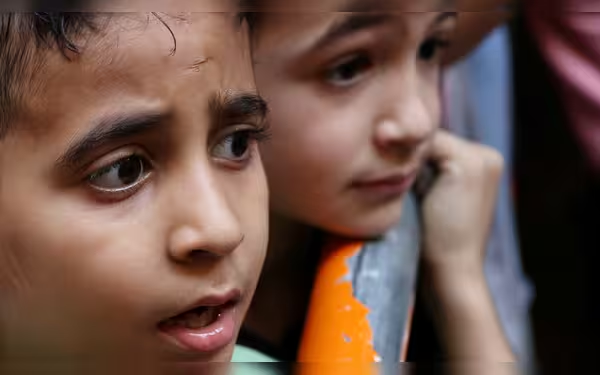Saturday, November 16, 2024 08:50 PM
UN Reports Over 400,000 Children Displaced in Lebanon Conflict
- Over 400,000 children displaced in Lebanon's escalating conflict.
- UNICEF warns of a potential lost generation due to war.
- Critical humanitarian needs as healthcare and education services collapse.
 Image Credits: arabnewspk
Image Credits: arabnewspkUNICEF reports over 400,000 children displaced in Lebanon due to escalating conflict, highlighting urgent humanitarian needs and education disruption.
In recent weeks, the situation in Lebanon has escalated dramatically, leading to a humanitarian crisis that has left over 400,000 children displaced. This alarming statistic was reported by a senior official from the United Nations children’s agency, UNICEF. The ongoing conflict, primarily between Israel and the Hezbollah militant group, has intensified, resulting in widespread violence and instability in the region.
As the conflict unfolds, more than 1.2 million people have been forced to flee their homes, with many seeking refuge in Beirut and other northern areas. The impact on children has been particularly devastating, as schools have been repurposed into shelters, leaving countless children without access to education. Ted Chaiban, UNICEF’s deputy executive director for humanitarian actions, expressed deep concern over the situation, stating, "What struck me is that this war is three weeks old and so many children have been affected." He highlighted that approximately 1.2 million children are currently deprived of education due to the war.
The public school system in Lebanon has suffered immensely, with many schools rendered inaccessible or damaged. While some private schools continue to operate, the most vulnerable populations, including Palestinian and Syrian refugees, are facing significant challenges. Chaiban emphasized the risk of a "lost generation," as hundreds of thousands of children are at risk of losing their learning opportunities.
The toll of the conflict is staggering, with over 2,300 people reported killed in Israeli strikes, a significant portion of whom are children. In just three weeks, more than 100 children have lost their lives, and over 800 have sustained injuries. The conditions for displaced families are dire, as many are crammed into overcrowded shelters, where multiple families share limited space and resources. Chaiban described the harsh reality, stating that "three or four families can live in a classroom separated by a plastic sheet, and where 1,000 people can share 12 toilets. Not all of them work." This lack of basic necessities exacerbates the already challenging living conditions for these families.
Moreover, the conflict has severely impacted healthcare services, with over 100 primary health care facilities out of service and 12 hospitals either non-functional or partially operational. The water infrastructure has also been targeted, with 26 water stations damaged, affecting nearly 350,000 people. UNICEF is actively working with local authorities to repair these essential services, but the need for immediate action is critical.
Chaiban has called for the protection of civilian infrastructure and a ceasefire in both Lebanon and Gaza. He stressed the importance of political will to resolve the conflict, stating, "What we must do is make sure that this stops, that this madness stops, that there’s a ceasefire before we get to the kind of destruction and pain and suffering and death that we’ve seen in Gaza." The urgency of the situation is underscored by the fact that the emergency response appeal for $108 million in Lebanon has only received 8 percent of the necessary funding.
As the world watches the unfolding crisis in Lebanon, it is crucial to recognize the profound impact on the youngest and most vulnerable members of society. The plight of these children serves as a stark reminder of the urgent need for humanitarian assistance and a peaceful resolution to the conflict. Without immediate intervention, the risk of a lost generation looms large, threatening the future of an entire nation.













